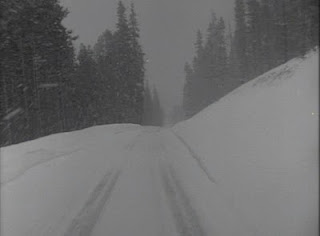Written by Buzz Bezzerides (Kiss Me Deadly), Nicholas Ray's cop classic begins at a simmer and accelerates to a kind of explosion not quite midway, when it comes almost to a full stop. It's hard to adjust to the changes: the scenery goes from black to white; the narrative goes from a straight line to a meandering stagger; the cast of characters, save for the protagonist, is exchanged entirely for another of a very different sort. The division into two acts is as striking as in, say, Kurosawa's High and Low, but where that film takes a suspenseful closet drama as far as it can go and replaces it with a welcome foray into an action-packed noir underworld, On Dangerous Ground disappointed my interest in the original storyline and my excitement about its setting by going the other direction.
The first act is the smoldering story of three NYC cops trying to find a gang of killers. It slowly dawns on Robert Ryan's character that his job is thankless, lonely, and hard, and he takes his frustration out on the stoolies and minor crooks he encounters along the line. Packed with incredible details (too-good-to-be-true "Chandleresque" noiralogue; handheld shots to simulate confusion and adrenaline; torrents of sexual tension; every glance, gesture, facial expression, and object is significant and conveys the pathetic horror of this man's life), it all ends too soon when our man goes too far (moving toward us slowly, exasperated, teeth grit, these words drop gruffly then explode from Ryan in a voice like frustrated Kirk Douglas': "Why do you make me do it? You know you're gonna talk... I'm gonna make you talk. I always make you punks talk! Why do you do it?! Why?!!" -beating commences-) and is relocated to a murder case upstate, in a snowy small town.
Every Nicholas Ray film I've seen deals on some level with force. The boiling anger of Ryan's justice-meting motherfucker brings up some basic questions about morals, specifically those of the inheritors of the monopoly of violence, a difficult duty that is apparently necessary for the survival of society. The other major Ray theme is the psychological confinement to a certain path or way of life that his characters experience, often symbolized by physical entrapment like Ryan's narrow city beat, and it's obvious how nicely the two themes fit together. But after crashing his car in the woods in pursuit of the small-town killer (accompanied by the bloodthirsty father of the victim), Ryan's character is suddenly free of any social or physical barriers, and is alone in the snow with his task and his tendencies. Free will is measured as ability to defy fate- will he cross the line, let his anger dictate his decision, or will he manage to overcome his own psychology and follow through with the case based on a system of ethics?
Unfortunately this discussion becomes only more and more obfuscated until by the end it seems to be abandoned entirely. First there is the shotgun-wielding hillbilly dad, who continues to announce his intention to execute the murderer immediately upon apprehension. It's unclear whether he is meant to represent the bad side of Ryan's character or act as a sort of foil- perhaps both, but the protagonists' position is inconsistent when not totally vague. It isn't long before they come to the house of a young blind woman, played by Ida Lupino, who of course happens to be the killer's brother. While her performance is sublime and the attention to detail that makes the first act so wonderful still provides much interest, the now-meandering story falls apart completely with her introduction and the rest of the movie is a slow resolution of the pursuit, punctuated by monologues and culminating in Ryan's out-of-nowhere conviction to become less of a hardass.
For all that, the second half isn't bad, and while sometimes boring it offers its own pastoral splendor. The first half, taken separately, could be the best film noir I've ever seen-- highly recommended.



No comments:
Post a Comment